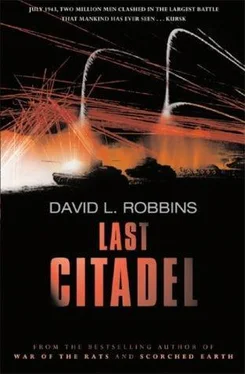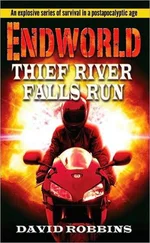With that, he spun Breit around and flung him out the door. The wind swept everything away – the plane, smoke, noise – and Breit tumbled head over heels.
In the first second of the fall he lost the plane, then he lost the ground, somersaulting through the rasping air. He shut his eyes against the sting. With crazed hands he clawed for the ripcord handle, then remembered the crewman’s thump over his heart. He fumbled at a metal clasp and yanked on it hard, once, twice, nothing happened, no parachute sprang to his rescue, he was tugging on something that wasn’t the ripcord! Wind roared in his ears, blood surged in his temples from his spinning and hysteria. He slapped all over his chest for the ripcord. He found nothing but straps and buckles. He forced open his eyes and the whirling world dizzied him almost to blackness. Then he caught sight of the handle flapping on the left strap. He plunged his right hand for it, snared it, and pulled, accepting that this was his last chance.
A pop and a flutter went off at his back. A solid grip snared him in the air, his shoulders and pelvis were wrenched. His legs flew out and almost out of joint, but now he was not wheeling over and over, he’d been yanked out of his fall. A white canopy unfurled overhead. Breit’s stomach had endured enough, he vomited into the open air, so hard all of it missed his uniform and boots. He watched the stream break into brown drops and fall. Breit was stricken by how close he was to the ground, the vast, twilit steppe.
Falling slowly now, Breit hung limp, exhausted. He looked up for the parachutes of the rest of the crew, hoping to see five. Only one white bloom trailed after him.
The He-16 smoked from both engines. Breit watched the Yak fighters ravening after it. He could count them easily now, there were four. He was still in the air with them, and their sounds hounding the dying bomber wracked his ears. Their guns chattered. Breit believed he could make out the sizzle of the rounds and the metal patter of their strikes. The smoking track of the bomber’s flight bent downward. The plane was riddled and killed. It whined, remorseful and beaten, then crashed into a proud fireball.
Breit tore his gaze from the crewman floating far above him. The young airman was the most helpless creature Breit had ever seen. The Red fighters came at him in a line, firing in sport at the dangling German. Breit listened to the machine-guns and yowling engines. He saw the airman wriggle to make himself hard to hit -how funny that must have seemed to the Soviet pilots – then churn as the huge rounds slammed into him. Breit looked away.
The fighters came around in a tight bank, propellers and tails almost grinding each other up. They came for him. Breit looked to the rising ground and pleaded with it to hurry. Break my legs, he thought, but hurry! He shot his eyes down to the earth, then back to the planes, measuring seconds and distance.
The first fighter leveled out. The other three zoomed behind it. Breit braced for the sparks of their guns. He looked below his boots, ten more seconds until he was down. The fighters traced the steppe, blowing back the grasses with the wash of their passing. The lead plane took a blast at Breit. Zings whipped by him, terrifying and invisible. He did the same dance as the dead crewman still drifting above, wiggling in the air to make himself a harder target.
Another burst from the first plane seared to his left, then the Yak roared by so close, his parachute swung in the roiled air. The second fighter closed fast and drew a bead. Breit nailed his eyes on the plane’s cowling, the muzzle for the cannon. The gun flashed.
Breit’s body jerked. He screamed, sure he’d been hit. His ankles and knees buckled with unexpected force and he crumpled forward. He landed on his right shoulder, stopping his screaming. He was down. He pitched to his back, looking up into the rippling, folding chute. The remaining fighters tore past so low the parachute caught their wind and tried to haul him back into the sky. He struggled with the pack and scrambled away.
Breit ran through a flat expanse of grass. The Yaks rolled again in formation, were they coming back for him? His breathing filled his ears, he didn’t know how to escape, he was no combat soldier. He dove into the thin reeds and lay still, panting. After seconds he peeked above the heads of the stalks. The fighters had cut short their circle and flew off to the north. Breit saw only the descent of the dead airman, who returned to earth without a whisper. The sky was clear and tinting red, stained.
July 9
0005 hours
somewhere west of Slatino
Past nightfall, a pillar of smoke spiraled from the downed bomber three kilometers away. Breit watched the black column rise and bend to the breezes that cooled the steppe and tossed the heads of the grasses where he sat. Night closed in and he did not think once to head away from the smoldering wreck or move off from the markers of the dead man’s parachute and his own. He waited where he believed German rear troops would come to investigate the crash and look for survivors. He had no idea what else to do, he wasn’t sure how this part of war worked. He was in German-held territory, but he was still in Russia. So he stayed in place and sat quiet under the most stars and the farthest-flung sky he’d ever seen.
Breit had been saved from the bomber by a miracle. The odds greatly favored his dying with the five crewmen, of Abram Breit becoming one of the fuels making that shaft of smoke still rising out there in the dark, or lying under his own silk chute, cut in half. Instead he was whole and alive and he had to get back to Berlin and to Lucy. Breit was not much of a believer in God, but he could not ignore evidence. Even if God had nothing to do with his narrow escape, Breit did believe in purpose. He’d been spared and that was enough to affirm his suspicion that he was on a great mission. The Soviets needed to know what he had to tell them, his facts and numbers, his insight about the Tiger tanks, the need to single them out everywhere they showed up. Abram Breit had been selected and protected for this very task. He didn’t ask by whom under the stars, but in his whole life he’d never been the one picked. He’d been on no adventures ever, until he became a spy. He’d not had that kind of youth, the campfire and skinned-knee boyhood of others, as a young man the sports teams and beering of men around him. Breit had studied, then taught, then as a soldier he’d catalogued stolen property. That was all changed now. Today’s exploit with the downed plane and the murdering Russian fighters and this black empty steppe was terrifying and had cost lives. This was war, and he was in it. Tonight he was special, a survivor. He carried the keys to history in his head. He felt alert and exhilarated.
Twice in the late dusk he saw locals moving across the grassland before the nightfall curfew. One group led a mule back from the plow somewhere. The old men and women stopped and gawked at the German plane burning at the far end of the field in the last red glow of day. A half hour after that, Breit lay on his stomach, pressed to the ground, as two peasants came near to harvest the silk of the collapsed chutes. He worried that the two old men might see the track of crushed stalks where he’d run from his chute, ending where he now lay. They would find him and do what? He was a German officer. They wouldn’t dare touch him. The reprisals on their village would be fierce. He hid anyway, not certain. The men cut the white chutes from the cords and lapped them around their shoulders. They left the airman’s grisly body alone and continued across the field chattering over their good fortune.
Breit waited for rescue. It was past midnight now. He listened intently, standing full in the darkness to cast his senses out in the field. Where was the German patrol investigating the crash? Isn’t that sort of thing done? he wondered. Of course it is. Perhaps with the battle going so hot, all the troops were committed to the north, pressing the attack. Yes, that’s it. Someone would come, certainly, but not tonight.
Читать дальше












